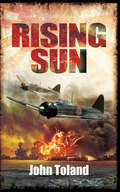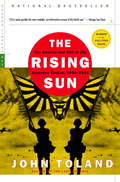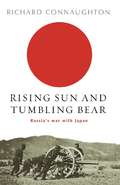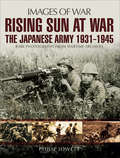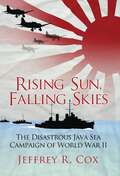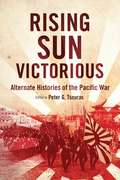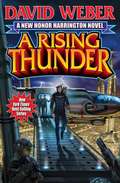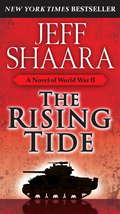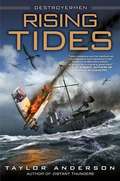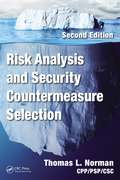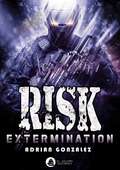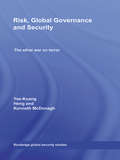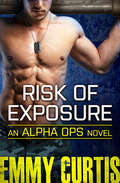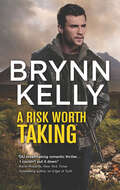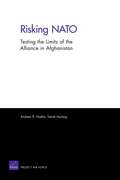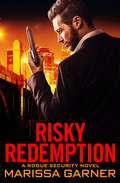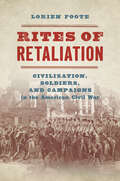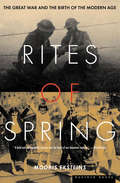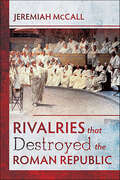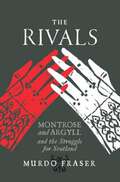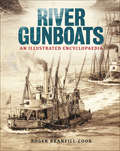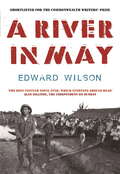- Table View
- List View
Rising Summer: the perfect happy and wholesome novel to escape with
by Mary Jane StaplesAre you looking for an engaging novel with a warm sense of humour and loveable characters? Mary Jane Staples has provided just that. Perfect for fans of Maggie Ford, Kitty Neale and Katie Flynn.READERS ARE LOVING TWO FOR THREE FARTHINGS'Brilliantly written, I couldn't put it down' - 5 STAR REVIEW'Another well written and observed story' - 5 STAR REVIEW'Another great story by Mary Jane Staples' - 5 STAR REVIEW*********************************************************AS WAR CONTINUES, WILL LOVE BLOOM?Tim Parkes was three when his parents were killed in a train crash and he went to live with his Aunt May. They managed splendidly - and then came the war.When Tim enlists and is posted to Suffolk, he isn't too pleased - Suffolk is Country, not like South London at all. But the City had followed him in the shape of evacuees, and those of them that weren't creating havoc in the Suffolk village were creating havoc in Tim's life.Minnie Beavers - ex-Camberwell - was fifteen, pert, pretty, and wildly in love with Tim. She was determined to marry him the minute she was old enough. Tim was equally determined to escape and find another girl.By the time Tim had gone away to fight and Minnie had joined the WAAF, a great many things had changed in both their lives...
Rising Sun: The Decline And Fall Of The Japanese Empire, 1936-1945 (Modern Library War Ser.)
by John TolandThis magnificent Pulitzer Prize-winning history, told primarily from the Japanese viewpoint, traces the dramatic fortunes of the Empire of the Sun from the invasion of Manchuria to the dropping of the atomic bombs, demolishing many myths surrounding this catastrophic conflict. Why did the dawn attack on Pearl Harbor occur? Was was inevitable? Was the Emperor a puppet or a warmonger? And, finally, what inspired the barbaric actions of those who fought, and who speak here of the unspeakable - murder, cannibalism and desertion? 'Unbelievably rich … Readable and exciting' —Newsweek 'The most readable, yet informative account of the Pacific War' —Chicago Sunday Times
The Rising Sun: The Decline and Fall of the Japanese Empire 1936-1945 (Modern Library War)
by John TolandThis history of World War II chronicles the dramatic rise and fall of the Japanese empire, from the invasion of Manchuria and China to the atomic bombing of Hiroshima and Nagasaki. Told from the Japanese perspective, The Rising Sun is, in the author's words, "a factual saga of people caught up in the flood of the most overwhelming war of mankind, told as it happened--muddled, ennobling, disgraceful, frustrating, full of paradox."In weaving together the historical facts and human drama leading up to and culminating in the war in the Pacific, Toland crafts a riveting and unbiased narrative history. In his Foreword, Toland says that if we are to draw any conclusion from The Rising Sun, it is "that there are no simple lessons in history, that it is human nature that repeats itself, not history."<P><P> Pulitzer Prize Winner
Rising Sun And Tumbling Bear: Russia's War with Japan (CASSELL MILITARY PAPERBACKS)
by Richard ConnaughtonThe definitive history of the Russo-Japanese warThe Russians were wrong-footed from the start, fighting in Manchuria at the end of a 5,000 mile single track railway; the Japanese were a week or so from their bases. The Russian command structure was hopelessly confused, their generals old and incompetent, the Tsar cautious and uncertain. The Russian naval defeat at Tsushima was as farcical as it was complete. The Japanese had defeated a big European power, and the lessons for the West were there for all to see, had they cared to do so. From this curious war, so unsafely ignored for the most part by the military minds of the day, Richard Connaughton has woven a fascinating narrative to appeal to readers at all levels.
Rising Sun And Tumbling Bear: Russia's War with Japan
by Richard ConnaughtonThe definitive history of the Russo-Japanese warThe Russians were wrong-footed from the start, fighting in Manchuria at the end of a 5,000 mile single track railway; the Japanese were a week or so from their bases. The Russian command structure was hopelessly confused, their generals old and incompetent, the Tsar cautious and uncertain. The Russian naval defeat at Tsushima was as farcical as it was complete. The Japanese had defeated a big European power, and the lessons for the West were there for all to see, had they cared to do so. From this curious war, so unsafely ignored for the most part by the military minds of the day, Richard Connaughton has woven a fascinating narrative to appeal to readers at all levels.
Rising Sun at War: The Japanese Army, 1931–1945 (Images Of War Ser.)
by Philip JowettThe Japanese Imperial Army was the most powerful force in the Far East through the 1930s and early 1940s, and this photographic history is the ideal introduction to it. In a vivid selection of archive images, most of which have not been published before, Philip Jowett covers its role in a series of conflicts, beginning with its invasion of Manchuria in 1931 until its final defeat in the Pacific War in August 1945. He describes the development of the army, its structure and organization and its expansion during these years, and illustrates its actions in a series of campaigns that are often overlooked in other books on the subject, including those in China between 1931 and 1937 and the Nomonhan campaign against the Soviet Union in 1938. The extraordinary ambition of the Japanese military during these years is dramatically revealed through the photographs and the accompanying text, and the book provides a graphic record of the Japanese armys performance against the opposing forces that were eventually ranged against it the Chinese, British, Soviets and Americans.
Rising Sun, Falling Skies
by Jeffrey CoxA fresh look at the disastrous Java Sea Campaign of 1941-42 which heralded a wave of Japanese naval victories in the Pacific but which eventually sowed the seeds of their eventual change in fortunes. In the immediate aftermath of Pearl Harbor, the Japanese juggernaut quickly racked up victory after victory. Desperate to secure resource-rich regions in the Pacific and ensure their continued dominance of South East Asia, Japanese forces were determined in their efforts to conquer Malaya, Singapore and the oil-rich islands around Java Sea - Borneo, Sumatra and Java itself. In the face of this seemingly unstoppable tide stood a small Allied force - American, Australian, British and Dutch. Thrown together by circumstance; cut off from reinforcements or in many cases retreat; operating with old, obsolete equipment and dwindling supplies, there was little hope of victory. Indeed, the month-long Java Sea Campaign, as it subsequently became known, quickly evolved from a traditional test of arms into a test of character. In the face of a relentless enemy and outnumbered, outgunned and alone, they defiantly held on, attempting to buy weeks, days, even hours until a better line of defense - and offense - could be established. These were the men of the US Asiatic Feet, the British Far Eastern Fleet, the Royal Netherlands Navy's East Indies Squadron and the Royal Australian Navy. And their supporting units like Patrol Wing Ten, the Royal Netherlands Naval Air Service, the US Army Air Force's 17th Pursuit Squadron and submarines of all these fine nations. A campaign that has been too often either ignored by historians or criticised for poor command decisions, this is the story of the sailors and the airmen at the sharp end, and how they fought and endured the first months of the War in the Pacific.
Rising Sun Victorious: Alternate Histories of the Pacific War
by Peter G. Tsouras<P> In war, victory can be held hostage to seemingly insignificant incidents-chance events, opportunities seized or cast aside-that can derail the most brilliant military strategies and change the course of history. What if the Japanese had conquered India and driven out the British? What if the strategic link between the United States and Australia had been severed? What if Vice Admiral Nagumo had launched a third attack on Pearl Harbor? What if the U. S. Navy’s gamble at Midway had backfired? <P> Ten leading military historians ask these and other questions in this fascinating book. The war with Japan was rife with difficult choices and battles that could have gone either way. These fact-based alternate scenarios offer intriguing insights into what might have happened in the Pacific during World War II, and what the consequences would have been for America.
A Rising Thunder (Honor Harrington Series, Book #13)
by David WeberPeril and strife strike on a double front for Honor Harrington and company. After a brutal attack on the Manticoran home system, Honor Harrington and the Star Kingdom she serves battle back against a new, technologically powerful, and utterly nefarious enemy. And as if that weren't task enough, Honor must also face down a centuries-old nemesis in the crumbling, but still mighty, Solarian League. The war between the People's Republic of Haven and the Star Kingdom is finally won and peace established, but grave danger looms-for there is a plan well on its way to completion designed to enslave the entire human species. Behind that plan lies the shadowy organization known as the Mesan Alignment. Task number one for Honor is to defend against another devastating Mesan strike-a strike that may well spell the doom of the Star Kingdom in one fell blow. It is time to shut down and secure the wormhole network that is the source of the Star Kingdom's wealth and power-but also its greatest vulnerability. Yet this is an act that the Earth-based Solarian League inevitably will take as a declaration of war. The thunder of battle rolls as the Solarian League directs its massive power against the Star Kingdom. And once again, Honor Harrington is thrust into a desperate battle that she must win if she is to survive to take the fight to the real enemy of galactic freedom-the insidious puppetmasters of war who lurk behind the Mesan Alignment! About Mission of Honor, #15 in the Honor Harrington series: "Weber combines realistic, engaging characters with intelligent technological projection and a deep understanding of military bureaucracy in the long-awaited 15th Honor Harrington novel...Fans of this venerable space opera will rejoice to see Honor back in action. "-Publishers Weekly "This latest Honor Harrington novel brings the saga to another crucial turning point...Readers may feel confident that they will be Honored many more times and enjoy it every time. "-Booklist About David Weber and the Honor Harrington series: ". . . everything you could want in a heroine.... excellent...plenty of action. "-Science Fiction Age "Brilliant! Brilliant! Brilliant!"-Anne McCaffrey "Compelling combat combined with engaging characters for a great space opera adventure. "-Locus "Weber combines realistic, engaging characters with intelligent technological projection. . . Fans of this venerable space opera will rejoice. . . "-Publishers Weekly
The Rising Tide: A Novel of World War II #1 (World War II #1)
by Jeff ShaaraA modern master of the historical novel, Jeff Shaara has painted brilliant depictions of the Civil War, the Revolutionary War, and World War I. Now he embarks upon his most ambitious epic, a trilogy about the military conflict that defined the twentieth century. The Rising Tide begins a staggering work of fiction bound to be a new generation's most poignant chronicle of World War II. With you-are-there immediacy, painstaking historical detail, and all-inclusive points of view, Shaara portrays the momentous and increasingly dramatic events that pulled America into the vortex of this monumental conflict. As Hitler conquers Poland, Norway, France, and most of Western Europe, England struggles to hold the line. When Germany's ally Japan launches a stunning attack on Pearl Harbor, America is drawn into the war, fighting to hold back the Japanese conquest of the Pacific, while standing side-by-side with their British ally, the last hope for turning the tide of the war. Through unforgettable battle scenes in the unforgiving deserts of North Africa and the rugged countryside of Sicily, Shaara tells this story through the voices of this conflict's most heroic figures, some familiar, some unknown. As British and American forces strike into the "soft underbelly" of Hitler's Fortress Europa, the new weapons of war come clearly into focus. In North Africa, tank battles unfold in a tapestry of dust and fire unlike any the world has ever seen. In Sicily, the Allies attack their enemy with a barely tested weapon: the paratrooper. As battles rage along the coasts of the Mediterranean, the momentum of the war begins to shift, setting the stage for the massive invasion of France, at a seaside resort called Normandy. More than an unprecedented and intimate portrait of those who waged this astonishing global war, The Rising Tide is a vivid gallery of characters both immortal and unknown: the as-yet obscure administrator Dwight D. Eisenhower, whose tireless efficiency helped win the war; his subordinates, clashing in both style and personality, from George Patton and Mark Clark to Omar Bradley and Bernard Montgomery. In the desolate hills and deserts, the Allies confront Erwin Rommel, the battlefield genius known as "the Desert Fox," a wounded beast who hands the Americans their first humiliating defeat in the European theater of the war. From tank driver to paratrooper to the men who gave the commands, Shaara's stirring portrayals bring the heroic and the tragic to life in brilliant detail. A new level of accomplishment from this already acclaimed author, The Rising Tide will leave readers eager for the next volume of this superb saga of the war that saved and changed the world.
Rising Tides (Destroyermen, Book #5)
by Taylor AndersonAs Lieutenant Commander Matthew Reddy and the crew of USS Walker continue their battle for both freedom and survival, the stakes become much more personal .... Reddy has found an unlikely but invaluable ally in Commodore Jenks of the New Britain Imperial Navy. And now they are united in their desire to hunt down the traitor who abducted two women both men would die to protect: Reddy's love, nurse Sandra Tucker, and young Princess Rebecca of the New British Empire. However, this battle will not be fought with broadsides and broadswords, but with cunning and intrigue. For when Reddy and Jenks report the situation to the New Britain Company, they are met with scorn and disbelief. It soon becomes obvious that the ruthless Company is attempting to overthrow the Imperial Throne--and that someone involved knows where Sandra and Rebecca are. From the halls of power to the ballrooms of the nobility, Reddy must navigate through a tempest of politics, deception, and betrayal if he is ever going to save the hostages and live to fight another day ....
Risk Analysis and Security Countermeasure Selection
by Thomas L. Norman CPP/PSP/CSCThis new edition of Risk Analysis and Security Countermeasure Selection presents updated case studies and introduces existing and new methodologies and technologies for addressing existing and future threats. It covers risk analysis methodologies approved by the U.S. Department of Homeland Security and shows how to apply them to other organizations
Risk Extermination: There is not anything to translate. (There is not anything to translate. #1)
by Adrián GonzalezChapter 1 I make a triumphal entry into the first room of the headquarters. Headquarters of the platoon two four five, in the Earth space. Although the operation was on a large scale banishing of the Tungs migration from the moon, the soldiers welcome me cheerfully, acclaiming only my name. I knew that the rumor would spread quickly and I kept hearing the exaggerated murmurs of the feat. "They say he killed over a hundred Tungs and destroyed the fort on his own," I heard one say. "They claim in our squad that he killed a thousand Tungs and a queen." Another soldier interrupted them. He did more than that, he took the colony by himself. The deed had been quite a feat in the hostile field of the third moon, but the rumors were ridiculous and exaggerated. I could not deny them or give them the truth that I should, morale was through the roof and I would not be the one to say that our casualties were as many as theirs. Despite this, we recovered territory by rolling back the enemy and that was a great victory for humanity. -Attention! Officer in the area,” a low ranking soldier shouted. We stayed still in front of the sergeant first. A thin man, of mature age, gray-haired and in good condition. Together with the ten men from my platoon, I made the corresponding salute. We struck the heel in unison while at the same time bringing the hand at a forty-five degree angle to the forehead. "Very good job soldiers, I congratulate you on taking key territory in the war against the Tungs," said the sergeant, after a brief pause he continued. In two hours we will pay our respects to the fallen and to our hero commemorated with three medals. We saluted loudly, they gave the order to break formation and we moved to our rooms. Mine was empty, I had lost my three companions, lifelong friends where we shared everything. The sadness came from the depths derailing through the eyes. Pietro had fallen in the first week,
Risk, Global Governance and Security: The Other War on Terror (Routledge Global Security Studies)
by Yee-Kuang Heng Ken McDonaghThis book applies risk society theory to the 'War on Terror', steering the discussion away from the militaristic discourse of the Bush era towards an emphasis on global cooperation and a new cosmopolitan agenda. The literature and rhetoric of the 'War on Terror' has been dominated by dramatic high-profile military campaigns and division in the international community. This overlooks the various multilateral practices and cooperative processes that are emerging to combat global terrorism. President Bush himself had initially been at pains to stress that his 'war' on terror would be like no other; it would involve not just military tools but financial, intelligence, police and diplomatic measures too. More than eight years later, the time is right for an in-depth evaluation of this 'other' war on terror. Yet these relatively mundane regulatory dimensions have received much less attention than the 'hot' wars in Afghanistan and Iraq, where ongoing difficulties suggest that military force alone is inadequate in controlling globalised terrorism. This book aims to redress this imbalance, by foregrounding these initiatives, tracing their implementation and reflecting on the implications for International Relations. Adopting an analytical approach that seeks to incorporate theories of risk, global governance and security, this book aims to explore the overlapping multi-level and multi-lateral dynamics of the emerging global security architecture which have remained neglected and unmapped thus far in the war on terror. This book will be of interest to students of risk politics, security studies, global governance and IR in general. Yee-Kuang Heng is Lecturer in International Relations, University of St Andrews, UK. Kenneth McDonagh is Lecturer in International Relations in the School of Law and Government, Dublin City University.
Risk of Exposure (Alpha Ops #6)
by Emmy CurtisHe is a trained professional-but nothing can prepare him for the hottest mission of his life. Assigned to protect his boss's daughter, British former SAS operative Malone Garrett breaks the first rule of covert surveillance-don't make contact. And especially don't take your mark out to dinner, then agree to a rooftop quickie. But now that Mal has Abby in his arms, he has no intention of ever letting her go. Abby Baston told herself it was a hit and quit, a one-nighter with a hot, handsome stranger whose hands were trained to take action. Working undercover for the CIA, she can't risk anything more. But when an international crisis ignites, Abby must make a call: trust Mal with her secret-and her heart-and partner up, or lose everything in a split second . . . More in the Alpha Ops seriesDANGEROUS TERRITORY (novella)OVER THE LINEPUSHING THE LIMITBLOWBACKCOMPROMISED
A Risk Worth Taking (The Legionnaires #3)
by Brynn KellyHe can’t outrun himself…Legionnaire Jamie Armstrong lives in the shadows. A medic haunted by his mistakes, he knows better than to hope for redemption. But his latest mission brings a threat he doesn’t see coming—an attraction as irresistible as it is dangerous. Hacker Samira Desta is a woman he swore to forget, but as a key witness to a deadly conspiracy, Samira is his to protect.But the woman he rescues might be the one who saves himAfter a year in hiding, Samira’s worst fears come true when her cover is blown and the unlikeliest of allies comes to her aid—the secretive Scot with whom she shared one unforgettable night. Hunted by lethal forces and losing the battle against their desire, Jamie and Samira make a desperate play to take the fight to their enemy—but those at greatest risk of ruin may be themselves…
Risking It All: A Naked Men Novel (Naked Men #1)
by Christi BarthWho doesn't love Naked Men? In Christi Barth's irresistible series, a group of close-knit friends talk out their problems with naked honesty on a popular blog. Bonded by a high-school tragedy, they're moving on from the past--and fighting for the future with strong and sassy women. Griffin Montgomery helps people. As a teenager, he kept his best friends alive after their soccer team's bus crashed in the Alps. Now, as a Coast Guard search and rescue pilot, he saves lives with reckless abandon--until he goes too far and earns a lengthy suspension. Working on the Naked Men projects keeps his mind busy, but Griff's itching to get back in the action. That's when he finds his latest rescue mission: a pretty wallflower who's stuck in her comfort zone. Chloe Widmore doesn't take risks. As a professional letter writer, she gets enough excitement out of expressing other people's emotions. So when the hottest man she's ever seen invades her coffee shop, Chloe surprises herself with how much she wants to be with him. Routines make her feel safe. Griff makes her deliciously unsafe, in so many ways. But falling for him is one risk she might just have to take . . . whether she's ready or not. Includes a special message from the editor, as well as an excerpt from another Loveswept title.
Risking NATO
by Andrew R. Hoehn Sarah HartingNATO's success in Afghanistan--or lack thereof--will have significant implications for the alliance itself. The authors examine the current mission in light of NATO's history and with an eye toward the future. NATO faces a long and daunting list of issues that extends beyond the borders of the member countries. The alliance must confront them, however, because failure to do so would risk its long-term success and sustainability.
Risky Redemption (Rogue Security #1)
by Marissa GarnerFour years ago, Angela Reardon was brutally attacked, and she still bears the physical scars and traumatic memories. While she's worked hard to overcome her fears and build a successful business, she's still haunted by her inability to identify her assailant. Now Angela only wants to be left alone-until a shadowy stranger reignites her desire to be loved. But their time together may be brief...because someone wants her dead.CIA assassin Jake Stone's targets deserved to die. Until now. Until he falls in love with the innocent woman he's been hired to kill. Jake can't fight his attraction to Angela, and he knows that someone else will be sent to finish the job. So can he save Angela and redeem himself by uncovering who wants her killed? When the trail leads him into the carnal underbelly of L.A., the truth is more shocking than even he could ever imagine.
Rites of Retaliation: Civilization, Soldiers, and Campaigns in the American Civil War (The Steven and Janice Brose Lectures in the Civil War Era)
by Lorien FooteDuring the Civil War, Union and Confederate politicians, military commanders, everyday soldiers, and civilians claimed their approach to the conflict was civilized, in keeping with centuries of military tradition meant to restrain violence and preserve national honor. One hallmark of civilized warfare was a highly ritualized approach to retaliation. This ritual provided a forum to accuse the enemy of excessive behavior, to negotiate redress according to the laws of war, and to appeal to the judgment of other civilized nations. As the war progressed, Northerners and Southerners feared they were losing their essential identity as civilized, and the attention to retaliation grew more intense. When Black soldiers joined the Union army in campaigns in South Carolina, Georgia, and Florida, raiding plantations and liberating enslaved people, Confederates argued the war had become a servile insurrection. And when Confederates massacred Black troops after battle, killed white Union foragers after capture, and used prisoners of war as human shields, Federals thought their enemy raised the black flag and embraced savagery.Blending military and cultural history, Lorien Foote's rich and insightful book sheds light on how Americans fought over what it meant to be civilized and who should be extended the protections of a civilized world.
Rites of Spring: The Great War and the Birth of the Modern Age
by Modris EksteinsThis award-winning cultural history reveals how the Great War changed humanity. This sweeping volume probes the origins, the impact, and the aftermath of World War I—from the premiere of Igor Stravinsky&’s ballet The Rite of Spring in 1913 to the death of Hitler in 1945. &“The Great War,&” as Modris Eksteins writes, &“was the psychological turning point . . . for modernism as a whole. The urge to create and the urge to destroy had changed places.&” In this &“bold and fertile book&” (The Atlantic Monthly), Eksteins goes on to chart the seismic shifts in human consciousness brought about by this great cataclysm, through the lives and words of ordinary people, works of literature, and such events as Lindbergh&’s transatlantic flight and the publication of the first modern bestseller, All Quiet on the Western Front. Rites of Spring is a rare and remarkable work, a cultural history that redefines the way we look at our past—and toward our future.
Rivalries that Destroyed the Roman Republic
by Jeremiah McCallThis is the story of how some Roman aristocrats grew so competitive in their political rivalries that they destroyed their Republic, in the late second to mid-first century BCE. Politics had always been a fractious game at Rome as aristocratic competitors strove to outshine one another in elected offices and honors, all ostensibly in the name of serving the Republic. And for centuries it had worked - or at least worked for these elite and elitist competitors. Enemies were defeated, glory was spread round the ruling class, and the empire of the Republic steadily grew. When rivalries grew too bitter, when aristocrats seemed headed toward excessive power, the oligarchy of the Roman Senate would curb its more competitive members, fostering consensus that allowed the system—the competitive arena for offices and honors, and the domination of the Senate—to continue. But as Rome came to rule much of the Mediterranean, aristocratic competitions grew too fierce; the prizes for winning were too great. And so, a series of bitter rivalries combined with the social and political pressures of the day to disintegrate the Republic. This is the story of those bitter rivalries from the senatorial debates of Fabius and Scipio, to the censorial purges of Cato; from the murders of Tiberius and Gaius Gracchus, to the ultimate rivalry of Caesar and Pompey. A work of historical investigation, Rivalries that Destroyed the Roman Republic introduces readers not only to the story of the Republic's collapse but the often-scarce and problematic evidence from which the story of these actors and their struggles is woven.
The Rivals: Montrose and Argyll and the Struggle for Scotland
by Murdo FraserThis dual biography &“deftly revisits 17th century Scotland to assess the roles of…two charismatic nobles who fought for supremacy&” (Scotsman, UK). The struggles of the Scottish Civil War of 1644-45 could easily be personified as a contest between James Graham, 1st Marquis of Montrose and Archibald Campbell, 8th Marquis of Argyll. Yet at first glance there seems to be more that unites them than separates them. Both came from ancient and powerful families and considered themselves loyal subjects of Charles I. Both were also betrayed by Charles II and died at the hands of the executioner. In The Rivals, Murdo Fraser examines these two remarkable men and shines a light on their contrasting personalities. Montrose was a brilliant military tactician, bold and brave but rash. Campbell was altogether a more opaque figure, cautious, considered and difficult to read. The resulting volume offers a vivid insight into two individuals who played a significant part in writing Scotland's history, as well as a fascinating portrait of early modern Scotland.
River Gunboats: An Illustrated Encyclopaedia
by Roger Branfill-CookA comprehensive, fully illustrated encyclopedia of river gunboats from the early 19th century to the present day. The first recorded engagement by a steam-powered warship took place on a river, when in 1824 the Honorable East India Company&’s gunboat Diana went into action on the Irrawaddy in Burma. In the 150 years that followed, river gunboats played a significant part in over forty campaigns and individual actions around the world. This comprehensive reference book covers the development of riverboat warfare from the early 19th century to current riverine combat vessels in service today. River gunboats proved to be the decisive factor in a wide range of conflicts across the world—from the New Zealand Wars to the American Civil War, and from both World Wars to the conflicts in Indochina and Vietnam. This lavishly illustrated encyclopedia describes the river gunboats that saw action, plus those converted river steamers which took part in combat. This volume also includes maps of the river systems where they operated, together with narratives of the principal actions involving river gunboats.
A River in May
by Edward WilsonA magnificent debut novel, which follows in the spirit of Conrad's Heart of Darkness, in which an alienated student named Lopez joins the Vietnam war to escape from his past and himself. Forced out of self-pity by the brutality and injustice surrounding him, Lopez begins to shed his layers of acquired culture, identifying instead with the Vietnamese and their cause. 'Stylistically sophisticated, visually and emotionally present; the pace is good and the author knows how to hold the reader's attention.'

